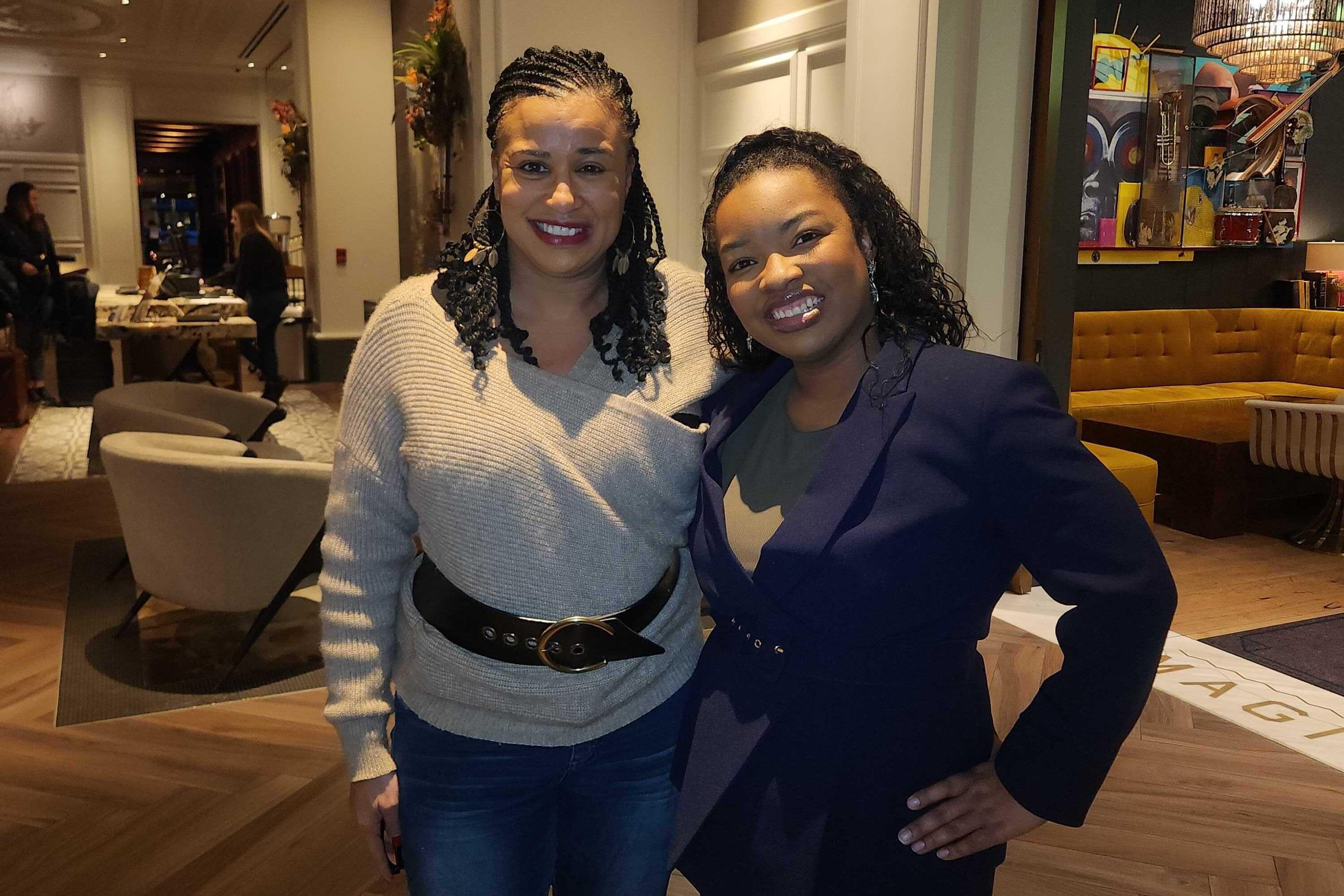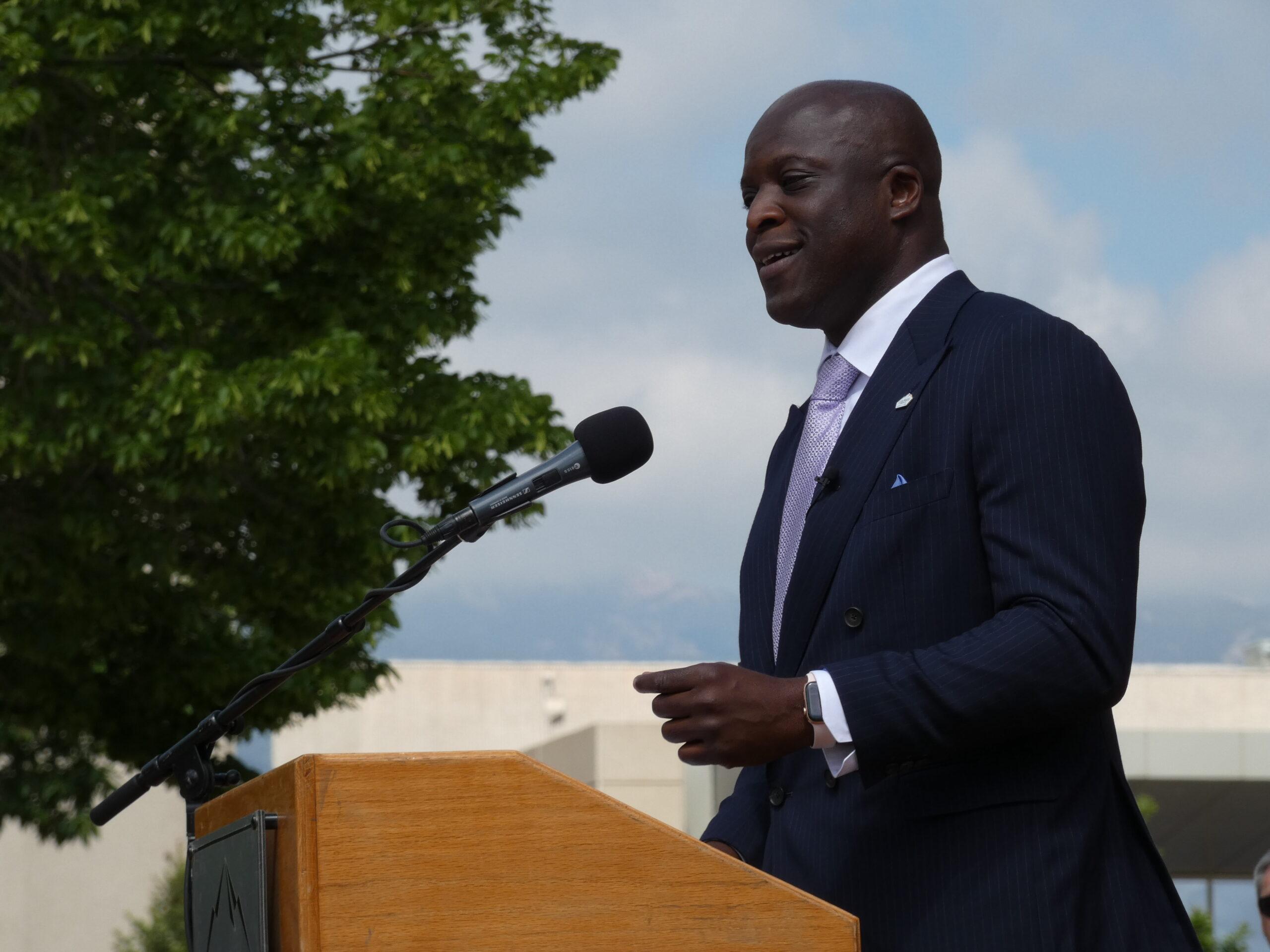
Gov. John Hickenlooper is part of a group collecting public input on whether to bid to host a future winter Olympic games, but there isn't much debate in his own mind.
"I think I see the benefits more clearly than I see the downsides," Hickenlooper told Colorado Matters.
- Colorado Once Said ‘No’ To Winter Olympics. Boosters Want To Try Again
- Salt Lake City is 1st in US to seek 2030 Winter Olympic bid (via AP)
He insists the public input process isn't just perfunctory, but, "In the process of collecting information, you let the public know the real facts," he said.
He wants Coloradans to know that the proposal does not include using public money to run the Olympics; that Colorado has most of the necessary buildings and venues already, and that the event wouldn't attract more people to the state than already come on any Labor Day weekend.
Hickenlooper also cautioned against the kind of anti-growth sentiment that contributed to Coloradans' decision to reject the 1976 Olympics. The governor believes that decision helped make the state's economy less diverse for more than a decade afterward.
"That is one of the reasons why our industry was so concentrated in oil and gas... and other industries weren't attracted and didn't come to Colorado," Hickenlooper said.
However, the governor said if Coloradans' feedback on the current bid is overwhelmingly against hosting the games, "I think the exploratory committee would say, 'We've explored, and we don't support it.'"
Hickenlooper also said he supports making the feedback available to the public.
Elsewhere in the interview with Colorado Matters, the governor expressed support for loosening federal restrictions on marijuana; explored whether Colorado should sue drug companies over the opioid crisis; and explained his out-of-the-box idea to make coding count as a foreign language in schools.
Interview Highlights With Gov. John Hickenlooper
On saying, after the latest killing of a sheriff's deputy, "enough is enough":
"We need to look at every possible explanation of how to protect our first responders... Do our sheriffs have the highest grade body armor? We have a request in the budget right now, has been in there for a couple months, for the state patrol to get the next highest level of body armor."
On downgrading marijuana from a Schedule 1 drug federally:
"I think that if that is something that could be done and allows us to look at marijuana in an objective way and gather scientific data, I would support that... We have a large-scale national experiment [going on with legalized marijuana], and I think being able to see whether this experiment is truly successful at some point will require descheduling or unscheduling."
On whether he supports the attorney general in challenging Clarence Moses-EL's appeal for compensation for the 28 years he spent wrongly incarcerated:
"I would prefer that the system would allow some compensation... I don't have all the facts. I have not been intimately part of this case the way [Attorney General Cynthia Coffman has]... But as a citizen... it feels wrong."
Full Transcript
Ryan Warner: Is this a genuine process to get public input, or are you just checking a box in front of a decision that's already been made? Gov. John Hickenlooper: So what would you expect I'd say? Yeah. I'm just going to check this box so we can ram this thing through. No, of course not. This is a process and you go out and collect information, and in the process of collecting information, you let the public know the real facts, right, that we're not going to use public money in any way. That's the idea that, at least the proposal is, that there would be no public money to fund the Olympics, it would all be done privately through sponsorships. RW: But there might have to be extra law enforcement, things that the public provides. JH: No, all paid for. Basically, we have all the infrastructure, all the buildings, so we would have to build some housing for an Olympic Village, but I think sponsors would help build that and, hopefully, that could be left behind as a affordable housing or at least a mixed development type of housing. Lord knows affordable housing's a big thing. I think part of this process is to go out and let the public hear that the Olympics aren't that many people. The Winter Olympics is I think, what, 500,000 or 600,000 people. I can't remember, over a period of ten days. The National Western Stock Show is more than that, and that just happens in Denver. The Olympics would be spread out in a couple of the ski resorts and in Denver. Look at what Denver does on Labor Day weekend. We have that many people in one weekend, in Labor Day weekend, coming in and out of just the city of Denver. So when you do an exploratory thing like this, you want people to get the real facts and understand what the benefits would be and what the downsides would be. RW: You haven't mentioned any of the downsides. I have to say you sound like a guy who wants the Olympics. JH: Well, I think I just gave you the positives because I know them. I know what the downsides are, as well. Some people are going to feel that we don't need more notoriety, that we've already got more than enough people, we don't want any. They want to pull up the drawbridges. I think one of the things that hosting an event like the Olympics allows a state to do is to show the world all the progress they've made, and if they've changed a lot in the last 10 or 15 years; they've built a transit system, they've got a great airport, a lot of the stuff that we've done that allows you to grow, as the infrastructure allows you to grow, that's where I come down and say, "Well, maybe that's a good idea." A lot of people think that's a bad idea because they don't want any more growth, but in 1972, Colorado went on the record as saying, "We don't want the Olympics. We've grown too much. We want outsiders to stay away." I think there's a strong argument that that is one of the reasons why our industry was so concentrated in oil and gas because they couldn't move anywhere, and other industries weren't attracted and didn't come to Colorado. RW: We talked last week with the head of the Exploratory Committee. I asked Rob Cohen if the comments from the public come in and they're 90 percent against or 90 percent for, would that be what the decision is based on? Here's what he said. Rob Cohen (on tape): If there's overwhelming evidence that the community does not want the games, then the games would not be successful, but what we want to make sure is that we're not only hearing from the minority people who are in favor of or the minority people who are against, but that we really have a good pulse on what everybody in the state of Colorado is interested in. RW: So back to that idea, it sounds like you want the Olympics. JH: I think I see the benefits more clearly than I see the downsides. Not to say, I mean look at our congestion right now. We obviously are trying to find the resources to address issues like transportation infrastructure or affordable housing, but I think there's a way to do a big event like this that could help you raise money for that. RW: What would be the determination about whether the Denver, the Metro area, Colorado, goes forward with a bid? What if comments are overwhelmingly against it? JH: I think the Exploratory Committee would say, "We've explored, and we don't support it." RW: I want to say that the survey, for instance, that's available right now is under the auspices of a nongovernmental organization. That means it's not public record what the responses are. Would you make public the comments that come in on this? JH: Sure. I don't have a problem with that. RW: Three sheriff's deputies have been gunned down since New Year's Eve, and in a statement released after the latest killing, you said, "We must come together and say, 'Enough is enough.'" What do you mean by that? JH: I think what I meant was that we need to look at every possible explanation of how to protect our first responders [crosstalk]. RW: Where is the first place you would look? JH: Body armor. Do our sheriffs have the highest grade body armor? We have a request in the budget right now, has been in there for a couple months for State Patrol to get the next higher level of body armor. Again, there's always going to be exceptions. Someone gets shot in the head or someone gets shot from behind or through the neck, but I mean, three cases, three fatalities, three separate incidents within 40 days. It makes me want to cry. It makes me want to weep. To sit by and say, "Well, we've done everything we can. It's just the way it breaks," which is what some people say, I don't think that's sufficient. RW: Where else would you look? JH: I think body armor. I think training procedures. When was the last time we did a best practices analysis on a state-wide basis? Again, I've got no facts on this. I just feel like, I think like most people, I'm sitting at home frustrated, broken-hearted that another young individual has been gunned down doing their job defending the people of this state. What, are we going to just say, "Well, that's too bad"? RW: There will be some, and certainly there will be some who won't say, "This is a guns issue." JH: I'm not sure it's a guns issue. I think if people are going to try and ban all the guns it could be, I mean, one of these fatalities was shot with a pistol. Another one was shot with a high-volume, high-caliber rifle. I mean, we have hunting weapons like that all over the state. Now, you can argue, is the magazine size too large or too small? That, at least so far, doesn't seem to be the issue, right? In any of these cases. I'm not sure there's a direct gun correlation here as much as there is, what I feel that we get the most return on is looking at and encouraging, again, I don't control the sheriff's departments around the state, but I do hope this is a wake-up call to all of them to re-evaluate their training. Where are we getting our standards from? Are these the best practices that we know keep our people as safe as possible? RW: A lot of people in Colorado are on pins and needles these days, people who work in the marijuana industry and people who use the drug, in regards to what the Trump Administration is going to do next. So clearly some people in the administration want to see more of a crackdown on legal weed since it's still illegal federally. Something that's come up with new life is that the federal law could change on this. A bipartisan group of lawmakers in Washington says it's working on this. What do you think of the idea of removing marijuana from the most dangerous category under federal law? Should that happen? JH: Well, de-scheduling or rescheduling marijuana, I don't have a problem with it. I think it's a very long, complicated process. I don't think it's a bad idea to propose it. One of the problems with marijuana is we have not been able to do the long-term, vertically integrated, medical studies on what are the consequences of repeated use of marijuana over, by adults, over a period of time. RW: But the company that marijuana keeps on that schedule I list. JH: Right. Heroin. RW: Do you have any sense that marijuana is as serious as those drugs? JH: No. It is certainly not for adults. Now I do, for children, I have been persuaded by a number of brain scientists that there is some risk. And even up into your early 20s, it's not a good idea to take high THC marijuana when you're at that younger age, but that's not the same as heroin. RW: So, you think that rescheduling or de-scheduling would be cumbersome, but would it be worth it? Would you support such an action? JH: Yeah, I think that if that is something that can be done and allows us to look at marijuana in an objective way and gather scientific data, I would support that. RW: It doesn't sound like it's something you're actively, say, lobbying the congressional delegation for. JH: Well, I think that our congressional delegation, and obviously not everyone, would support that. What we're doing right now is we have a large-scale national experiment, and I think being able to see whether this experiment is truly successful, at some point it will require de-scheduling or unscheduling. RW: What kind of change do you think on marijuana policy is realistic at the federal level right now? JH: Well, I would be delighted if Congress would provide some protections to the states to allow them for banking, for instance. I think that's something that could be done through rule-making or through Congress. I, personally think the states, state by state, should be allowed to, just like with alcohol, vote thumbs up or thumbs down for marijuana. Within that context, just as we see in Oklahoma, parts of Texas, there are dry counties that you can't buy liquor. I think the same way counties in Colorado or other states should be allowed to have that freedom as well, although obviously, each state would have to make that decision. RW: You're listening to Colorado Matters. I'm Ryan Warner and we're back at the state capitol for our regular conversation with the Governor of Colorado, John Hickenlooper. To opioids now. So a mostly rural county in southern Colorado just became the first in the state to sue drug companies for their role in the opioid crisis. Deaths from opioids and heroin are particularly high in Huerfano County and they say the drug companies put profits ahead of patients' well-being and overstated how safe these narcotics really were. Other counties may do the same and they have across the country. Some states have joined this legal action as well. Colorado's not among them. Do you think Colorado should sue the drug companies? JH: Well, you certainly should talk to the attorney general. Attorney General Coffman, that's in her purview more than it is mine. RW: Is it something you'd like to see her do? JH: I would certainly like to see a robust exploration of what are the facts because there was so much effort and resource that this was a great way to deal with pain. Even as we began seeing this opioid epidemic unfolding, it didn't seem like there was any response by the pharmaceutical companies and even by, in many cases, the medical establishment. RW: You talk about exploring this. I mean, isn't it pretty clear that the drug companies acted to at least obfuscate in this case? JH: That I don't have the information. Again, I hear stories. I hear tales. RW: You're not convinced of them? JH: Yeah, but we are going to go out and get that information. RW: What more do you want to find out about how these pharmaceuticals acted? JH: So I'd like to see at what point they're marketing. How did it change? At which point, were they aware and was it clear? Did the addiction start really at scale? Was it in 2000 or was it 2005? Was it 2010? I don't have those facts, but I think that's relevant to if we already knew we had a wide scale epidemic and the pharmaceutical companies were still out there selling as hard as they could. Not putting any more disclaimers. Not going to the state medical associations or the national medical association saying, hey doctors, you need to cut back prescriptions this is something that's, we're worried about what the unintended consequences are. Certainly the stories that we're hearing are that nothing like that happened. That there was an unbridled passion to sell more opioids. If that's true, even after everyone was aware that this was becoming a crisis, call the lawyers. RW: One more legal question for you. This is about a man who spent 28 years in prison for a crime he was later acquitted of. Clarence Moses-El is seeking compensation from the state for all that time he was wrongly locked up. He could get almost two million dollars. In this case, Attorney General Cynthia Coffman is fighting Moses-El's claim saying he hasn't proven he was actually innocent. Moses-El's lawyer says the evidence to prove that was destroyed by police. Do you think that the attorney general has made the right decision here? JH: Well, certainly the loss of the DNA evidence is unbelievable and regrettable. There's human error and I accept it, but for this person to lose that period of his life and then he isn't even allowed to have recourse to the compensation that everybody else gets because, not only did they conspire against him to make sure that he got convicted when he wasn't guilty. I think that is largely I think pretty much everyone accepts that now, not everyone, many people accept that. I would prefer that the system allowed some compensation. That the attorney general could say, well you lost the evidence. We don't think two million dollars is appropriate even though that's how many days and at what cost we use, that's what's right, but maybe since the evidence was lost we'll give you some lesser compensation. RW: Do you know if there's anything that prevents the attorney general from doing that? JH: My understanding, now, I'm not a lawyer, and you'd have to talk the attorney general. My understanding is that, that is a calculation that it's either all or nothing, and that she's using, well the DNA is lost therefore you get nothing. RW: Do you agree with her decision? JH: You know I don't have all the facts. I don't, again, I have not been from the beginning to the end intimately part of this case the way she has. RW: Let me say that the attorney general's office has argued they're looking at the Exoneration Act, this relevant legislation, carefully and Moses-El hasn't met the legal threshold to get that money. JH: And they're lawyers and they, one would hope, understand this at a deeper level, but as a citizen, and I think I represent people that aren't lawyers and just know what we know from the papers and not a detailed knowledge of what the law specifics are, it feels wrong. RW: I'll say that the dispute between the AG's office and Moses-El and his attorneys means that there'll be a civil trial with a jury, which will undoubtedly cost taxpayers something. Although, I can't say how it compares to the say, two million, that Moses-El is asking for. OK, I want to ask you about an unconventional idea you shared in your State of the State speech. That computer coding could be considered a foreign language like in schools that require French, or Spanish, or some other language, students could take coding instead. Is that an idea you're serious about pursing? JH: Absolutely. I think a, our world is changing so rapidly that coding is becoming, I think in five or 10 years it's going to be a base requirement that every kid if they're going to have an opportunity to compete for the good jobs in the emerging economies, they're going to have to have some knowledge of coding. They don't have to major in it. They don't have to be "fluent" but I think more and more kids to get good jobs, you're going to need to know something about coding. I think that in a funny way learning coding is not that dissimilar from learning a language. RW: What would have to change to make that a foreign language? Like we're a local control state, meaning that local districts exert a lot of control, but would that be about the Colorado Department of Education sort of recognizing it in that sense? Applying the credits or something? JH: Well they could recognize it and encourage local districts because you take two or three years of coding, you've got a big head start. Doesn't mean you're going to become an electrical engineer or you're going to go to MIT. But it, I mean all robots, automation, all these new technologies, are going to need technicians and those technicians aren't going to need a college degree. But they are going to need to know something about coding. RW: So just briefly, you've made this a priority then for the Secretary of Education? JH: Well certainly we've discussed it. Yeah. We are a local control state as you point out rightfully. So we have to use persuasion rather than the stick. We're using carrots. RW: Which is also a computer symbol. JH: There you go. RW: Which carrot are you using? JH: I'll start using that more often. I like that Ryan. RW: Governor, thanks for your time. JH: You bet. Anytime. |









